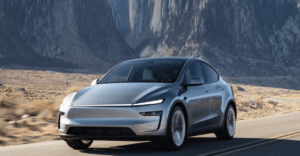Tesla Sales Plunge 45% in Europe Amid Rising Competition and Musk Controversy
Tesla’s European sales plummeted 45% in January 2025 compared to the previous year, despite overall EV sales in the region growing by 37%. The decline was particularly severe in Germany, where sales dropped nearly 60%, as well as in France and Norway. Factors contributing to the slump include delayed purchases ahead of the Model Y refresh and the lack of a more affordable Tesla model. Meanwhile, Chinese automaker SAIC saw a 36.8% sales increase, selling more than twice as many vehicles as Tesla in Europe.
Additionally, Elon Musk’s political controversies, including his involvement with Germany’s AfD party, have sparked backlash and boycott calls in some countries. In response, Tesla has introduced sales incentives, but growing competition and reputational concerns continue to pose challenges. Since President Trump took office, Tesla’s stock has fallen by about a third, wiping out post-election gains.

Tesla Sales Plunge 45% in Europe Amid Rising Competition and Musk Controversy
Tesla’s sales in Europe have seen a sharp decline, according to recent data from the European Automobile Manufacturers’ Association (ACEA). The report reveals that new Tesla registrations in the EU, Iceland, Liechtenstein, Norway, Switzerland, and the U.K. fell by 45% in January 2025 compared to the same period in 2024. This drop comes despite an overall 37% rise in electric vehicle sales across the region.
Country-specific data indicate even steeper declines, with Tesla sales plummeting nearly 60% in Germany—Europe’s largest EV market—along with significant decreases in France and Norway. Industry expert Mark Wakefield, from AlixPartners, cautions that monthly fluctuations make it difficult to draw firm conclusions and suggests looking at quarterly trends instead. However, Tesla’s recent incentives to boost sales also point to weakening demand.
Several factors may be contributing to this downturn. Tesla has yet to deliver on its promise of a more affordable model, and with an updated version of the Model Y expected soon, some buyers may be delaying their purchases. Additionally, competition from Chinese manufacturers, particularly SAIC Motor, has intensified. According to ACEA data, SAIC saw a 36.8% increase in sales, more than doubling Tesla’s sales in Europe for the month.
Another possible influence is public backlash against CEO Elon Musk’s political activities. Musk’s controversial statements and appearances at right-wing events, including a virtual speech for Germany’s AfD party, have sparked outrage. In Germany, an image of Musk’s gesture during a speech was projected onto Tesla’s Berlin Gigafactory with the word “Heil” added, while a satirical London ad labeled Tesla as a “Swasticar.” Following Musk’s remarks on Germany’s historical accountability, Poland even called for a Tesla boycott.
While Wakefield acknowledges the strong public response in Germany, he notes that executive controversies typically have a limited impact on consumer buying behavior. Nevertheless, Tesla’s latest SEC filings acknowledge the risks posed by rising competition in Europe. The company highlighted increasing pressure from Chinese automakers, shifting consumer preferences, and evolving government policies as potential challenges. Additionally, the filings emphasize the need for continued innovation and strategic pricing adjustments to maintain Tesla’s position in the rapidly growing EV market.
The company has not publicly addressed the sales decline, nor has Musk commented on the situation. Meanwhile, Tesla’s stock price has dropped by about a third since President Trump took office, effectively wiping out the gains it made post-election. Analysts suggest that a combination of factors, including increased competition, market saturation, and consumer hesitation due to Musk’s controversial political involvement, may be affecting investor confidence. Additionally, Tesla’s struggles in Europe coincide with growing pressure from Chinese automakers and shifting government policies on EV incentives. If the company fails to regain momentum, it may need to accelerate its plans for a more affordable model to stay competitive.
Check out TimesWordle.com for all the latest news
You must be logged in to post a comment.